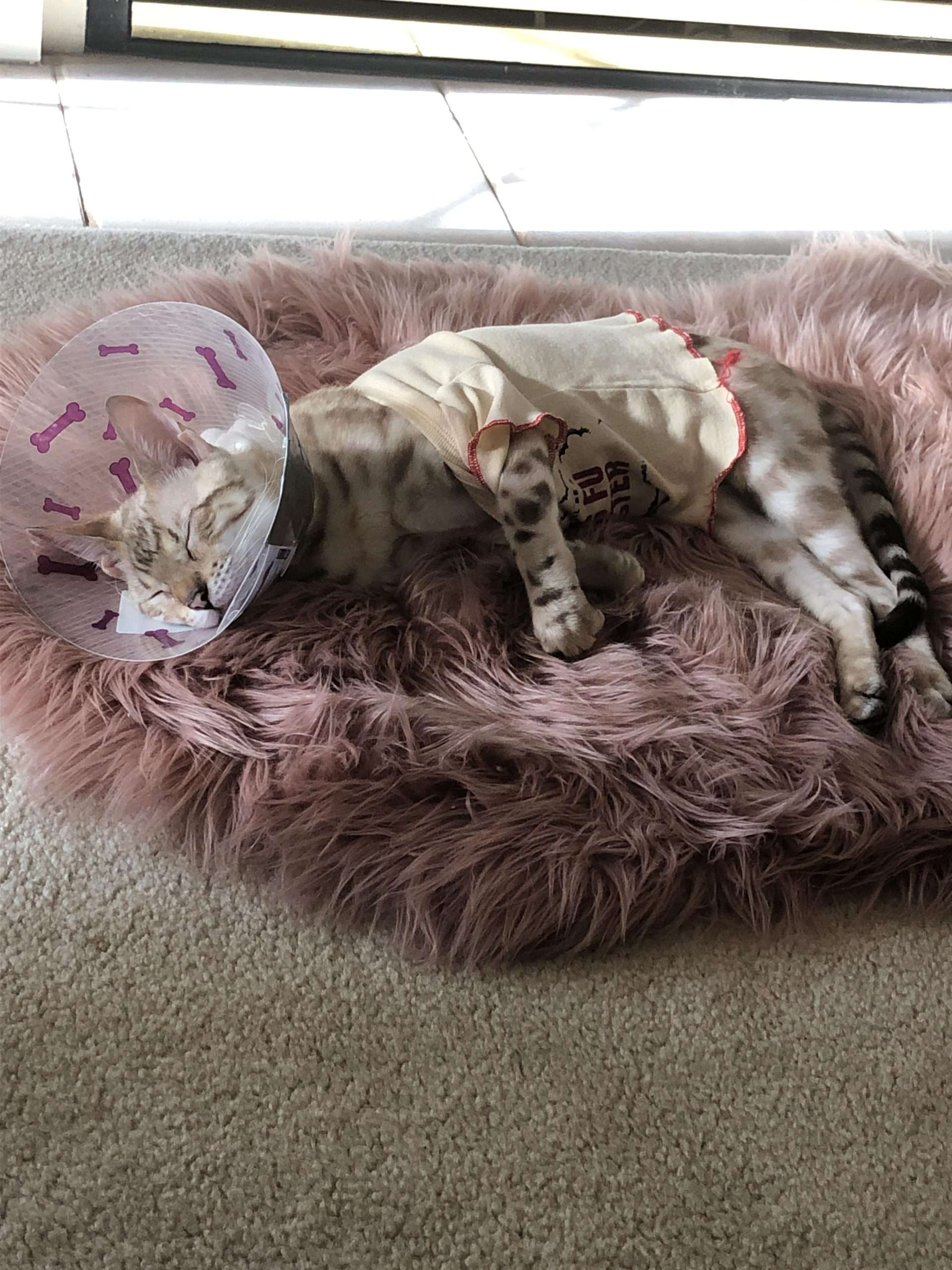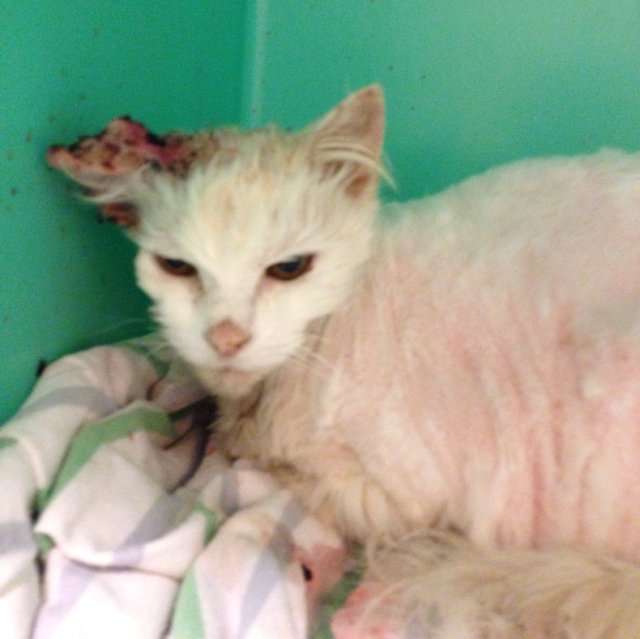Should I Keep My Cat In A Cage After Neutering
You shouldnt allow him to climb stairs, run, jump, or even play during the first-week post-operation. Letting the newly neutered/spayed cats move too much can slow down the cuts healing process. To be on the safe side, its important to keep your cat inside a small room, in a crate or inside a carrier.
When Can You Spay A Female Kitten
Veterinary medicine is a process, meaning it develops and changes over time. For this reason, it was previously believed that the best time for a female cat to be neutered was after she has had her first litter. This is a misconception which still pervades.
One of the reasons for this misconception is that female cats need to have a litter as it will provide them health benefits. From a veterinary perspective, there is no evidence to suggest having a litter will provide such benefits. In fact, pregnancy can provoke various health related issues. It can exacerbate existing health issues and also cause various health problems, some of which can be fatal.
For this reason, we need to consider two main things when we ask when can we spay a kitten?:
- Age: when a female kitten reaches the age of 8 weeks, we should then consider performing the spay procedure. However, the veterinarian may defer for a shorter period of time. Ideally, a female kitten should be spayed before her first heat as it helps reduce the possibility of breast cancer by another 10%.
- Weight: another important factor in when a cat can be spayed is her weight. Generally, if she is under 2 lbs in weight, the veterinarian will wait until she reaches this threshold before performing the surgery.
Neutering A Kitten Ensures Domestic Tranquility
Millions of euthanized cats is sad, but still somewhat abstract. Lets look at more practical reasons to neuter your male kitten at the earliest opportunity. Behaviorally, having a male kitten fixed has long-term consequences. Intact male cats have needs beyond sex, including territory and violent conflict. Neutering a kitten between the ages of eight weeks and five months places limits on the production of male hormones, minimizing his desire to roam and to fight with other cats.
Intact cats of both sexes also regularly engage in the act of spraying. Spraying serves a variety of communication functions between cats. Cat urine, especially that of intact males, contains pheromones and other chemicals that produce foul odors that are useful to cats, but which cause our couches, bookshelves, and table legs to reek. Spraying is linked to, but is not exclusively, an expression of sexual desire. Getting a male kitten neutered will not prevent him from ever spraying anywhere, but it will dramatically reduce the urge and the strength of the scent.
Also Check: How Much Food Should An Adult Cat Eat
Why Should I Have My Cat Spayed
It is recommended that all non-breeding cats be sterilized. Several health benefits are associated with spaying your cat. First, spaying eliminates the risk of ovarian and uterine cancers. Second, breast cancer is the number one type of cancer diagnosed in intact female cats. If your cat is spayed before her first heat cycle, there is less than ½ of 1% chance of developing breast cancer. With every subsequent heat cycle, the risk of developing breast cancer increases. After about 2½ years of age, ovariohysterectomy offers no protective benefit against developing breast cancer.
Unspayed female cats also carry the risk of developing pyometra a fatal condition of the uterus that requires surgery to treat.
Finally, cats with diabetes or epilepsy should be spayed to prevent hormonal changes that may interfere with medications.
How To Care For Your Cat After They’ve Been Spayed/neutered

Although cats will feel better a day or two after surgery, owners will still need to make sure their cat is limiting their activity, as not to rupture or strain the recent sutures. âThis is one reason why an e-collar is required in cats after they’re spayed/neutered,â explains Dr. Mar.
The main aftercare is ensuring your pet is comfortable and pain medication is given if needed, the collar is kept on, and your catâs activity is restricted in order for them to heal quickly and smoothly.
Read Also: What Is Hp Lovecraft’s Cat’s Name
How Does It Work
Spaying a pet consists of surgically removing the reproductive organs in a female dog or cat. By contrast, a neuter is removal of a male dog or cats testicles so he becomes impotent. Both surgeries produce a positive hormonal change in your pet. They no longer engage in hormone-related, blind behavior, and instead become a loving member of your family.
The process begins with general anesthesia. While male cat neutering is extremely rapidonly requiring about two minutesall other pets require a breathing tube in their mouths to ensure their stability. A male dog neuter or female cat spay can take up to twenty minutes, while a female dog spay is often up to ninety minutes, requiring the highest level of attention.
Cats With One Or Two Retained Testicles
If your cat has one or two retained testicles , a surgical incision may be made in multiple locations.
Sutures are often used to close the abdomen after the testicle are removed. Non-dissolvable skin sutures will require removal in 10-14 days, while intradermal sutures will dissolve on their own with time.
An E-collar or recovery bodysuit may be used to prevent licking or chewing the incision after surgery. Sutures can become itchy to many cats following surgery, and even if your cat doesnt start chewing at the incision right away, they may as time progresses.
Enforce any activity restrictions from your veterinarian to ensure proper healing.
Read Also: Are Umbrella Trees Toxic To Cats
When Should I Spay/neuter My Cat
Healthy cats as young as six weeks of age can be spayed or neutered safely. Studies have shown that cats altered at less than six months of age do not have an increased risk of physical or behavioral problems, as compared to those that undergo surgery later. Early-age spaying and neutering may prevent problem behaviors before they occur. If it hasnt already been done, spaying or neutering should be considered for any pet with a behavior problem, regardless of age. For certain behaviors, surgery may reduce or eliminate the problem, even in older cats. Consult with your veterinarian or veterinary behaviorist for further information.
What Is Spaying And Neutering
Sterilizing a cat is known as neutering for males and spaying for females. Neutering a male cat is a fairly simple procedure performed by a professional veterinarian. The cat is placed under general anesthesia, and the testes are removed through an incision in the scrotum. The incision is very small and stitches are usually not even necessary.
Spaying a female cat is a more involved and invasive procedure, and as such is often more expensive. The ovaries, fallopian tubes and uterus are removed after the cat is immobilized with general anesthesia. The operation is known as an ovario-hysterectomy. The abdominal area is shaved and the surgical wound usually only requires a few stitches.
Kittens should be spayed or neutered when they reach sexual maturity, which is usually between four and six months of age. However a cat can be safely spayed or neutered at any age, so even older adopted cats should have this procedure.
Some rescue organizations participate in a catch and release program where homeless cats are captured, neutered or spayed and released. This is considered more humane than euthanizing strays. The catch and release program is sometimes known as TNR and the cats that are sterilized have part of one ear clipped. If you adopt a cat with a clipped ear, he or she has almost certainly been already spayed or neutered as a result of this effort.
Read Also: Umbrella Plant Toxic To Dogs
Spaying A Cat In Heat
If your cat is in heat, her instincts and hormones are telling her to mate. Therefore, she will go to great lengths to escape the home and find males to mate with. This is why a cat in heat should be kept securely indoors to avoid an unwanted pregnancy.
Unfortunately, it can be frustrating to live with a cat exhibiting the signs of estrus. Cats in heat tend to vocalize excessively. They may obsessively try to escape their homes. Some will even mark areas of the home with urine.
If you don’t think you can deal with this behavior for about a week, then you may ask your vet about having her spayed as soon as possible. Though spaying a cat in heat is not ideal, it can be done. However, there are some disadvantages to this.
When a cat is in heat, the blood vessels that supply the reproductive organs and surrounding tissues become engorged with blood. The tissues may be more prone to tearing. This adds up to a surgery that is more complicated and lengthy than a routine spay. It will also be more expensive because of the extra time and supplies needed. Though the increased risk to the cat is minor, some vets prefer to avoid doing surgery on a cat in heat.
If you have scheduled your cat’s spay surgery in advance and find that she has started her first heat right before the surgery, be sure to contact your vet for advice. It may be more practical for you, your cat, and the vet to postpone the surgery.
How Do I Prepare My Cat For Spaying
No food and water: Food and water are often withheld the night before the surgery to prevent vomiting and aspiration. 4. Be calm: Pets tend to feed off their owners emotions and if you are nervous your pet can sense that. When you bring your pet in for surgery do your best to be calm and reassuring.
Also Check: Blue Buffalo Healthy Gourmet Cat Food Reviews
How Do I Comfort My Cat After Being Spayed
Best Places to Put a Cat After Surgery
airplane-style dog crate for their cats post-op recovery space. These crates often have more than enough room for a bed where a cat can lounge and relax, but not get into too much trouble. A large enough crate should provide space for their litter box and food/water.
Cat Neutering Side Effects + Risks

But what are the potential cat neutering side effects of being spayed or castrated? And does the age at which this takes place make any difference?
Well, concerns often voiced by veterinary staff include increased anesthetic risk, the development of low blood glucose which can be very dangerous and finally orthopedic problems.
Lets address these as well as some other problems people have suggested develop either after neutering in general or early age desexing.
Starting with anesthetic death, in several studies there is no difference in death rate with those undergoing this procedure from as early as 7 weeks to the those cats being anesthetized as adults. Several different anesthetic techniques have also been looked at and all that were studied were found to be safe.
There is a risk with every anesthetic and surgical procedure but in reality this risk is very low at around 0.1% and the age at which a cat is neutered doesn’t seem to affect this risk. In fact, those cats neutered earlier actually seem to develop fewer minor surgical complications.
Lets look at orthopedic or skeletal issues next. We know in dogs that if they are neutered too early they may be at increase risk of developing joint issues. It doesn’t appear cats are the same. for a start they very seldom develop cruciate ligament rupture and if they do it is generally because of a traumatic event. The also rarely suffer from dysplasia, or abnormal development of their joints.
Read Also: How Long Can Wet Cat Food Stay Out
Cat And Dog Pregnancy Termination
Even in these days of routine, early spay and neuter, every now and then pet owners can still find themselves in the uncomfortable situation of having a female dog or cat that goes into heat under circumstances that might result in an unwanted pregnancy. This situation brings up a lot of questions about what actions are possible and what interventions are appropriate either personally or medically.
What If I Dont Spay Or Neuter My Cat
Some people choose not to neuter their cats. If you decide to keep your cat intact, bear the following points in mind:
- Unneutered cats roam away from home more often, so theyre at increased risk of being hurt in a traffic accident if you let your cat outdoors.
- Male unneutered cats are more aggressive than their neutered counterparts.
- Female cats go into season once every three months. While in season, theyre noisier, more anxious and far more demanding.
- Unspayed female cats have up to three litters per year, with as many as six kittens in each litter and that can get expensive.
- Many unspayed female cats develop mammary cancers by the time theyre six or seven years old. If you decide to leave your female cat intact, check her regularly for lumps and speak to your vet if youre concerned.
Recommended Reading: Cats Tail Bones
Is The Spay/neuter Surgery For My Cat/dog Free
- The surgery is not free. However, many places have very low-cost surgeries, especially for people with low income. Some programs and clinics are open to all regardless of income. Each program is different, and we have about 2,000 programs nationwide. We try to match you with the most appropriate and nearest clinic or veterinarian. Clients are required to pay the veterinarian at the time of surgery.
What Are The Signs Of A Cat In Heat
If your female cat is not spayed and seems to be acting a bit strange, she could be in heat. Here are common signs that female cats are in heat:
- Excessive vocalizing. If your cat is normally quiet and will not stop yowling, chances are shes calling out for a mate.
- Super affectionate. If your female cats affection level has risen, it could be a sign that shes in heat. Cats in heat will rub up against any surface, including you, to spread their individual scents. Cats scents change when theyre in heat. Kitty is letting every tomcat know shes looking for a sire.
- She wants out of the house. Indoor female cats who all of a sudden are incredibly determined to get outside may be in heat. She may smell a possible mate outside, or she wants to continue spreading her scent to advertise her availability. If you have an outdoor cat, she may not return as frequently.
- Excessive licking of the genitals. Cats who are in heat may have a swollen vulva or a slight discharge. If your female cat is spayed, this could be a sign of an infection.
- She assumes the position. Cats in heat will present themselves for potential mates by flattening the front of their bodies on the ground and sticking out their rear ends. This makes it easier for male cats to mate with them.
You May Like: How To Train A Kitten Not To Bite
What Complications Can There Be With Spaying
The biggest complications associated with spaying come from the potential weight your cat can gain, which in turn can lead to serious health conditions. Diabetes and joint disease are both linked to obesity in cats, while sedentary or indoor cats can end up with digestive issues due to a lack of movement and lots of time spent grooming themselves.
How Long Does It Take A Cat To Recover From Spaying/neutering
Dr. Mar points out that animals are incredibly resilient and cats are no different. âThe first 24-48 hours your cat may be a bit painful and tired, which is expected after any surgery,â she explains. âHowever, pets are given pain medications before or during surgery in order to ensure your pet is not in pain when they wake up.â The pain medicine is generally taken for three to five days after the surgery. Neutered cats will recover much faster because removing an external organ such as the testicles does not open up the abdominal cavity and require stitching the way itâs done with spaying.
Also Check: How Many Calories Should Cats Eat A Day
Should I Get My Cat Spayed
Its up to you whether you decide to get your queen spayed, or whether you want them to have kittens in the future. There are a number of benefits to spaying/neutering your cat the most important is that it can significantly increase their lifespan.
Spaying can also:
- Reduce the likelihood of your queen fighting with other cats
- Reduce the likelihood of STIs spreading
- Limit the number of stray cats that occur with unwanted litters
- Reduce the signs of being in heat, which can be noisy and irritating for owners
Why Should You Spay Or Neuter Pets

For female pets, spaying provides important health benefits, while castrating male pets can help reduce their anxiety and aggression. For pet owners, its helpful to eliminate the dilemma of unwanted litters. Society benefits from decreased pet overpopulation and the public-health problems that arise with feral animals society further benefits as we limit the number of animal-control, shelter and euthanasia programs needed for unwanted, neglected, stray and feral pets.
In fact, spaying and neutering has so many advantages that veterinarians at Colorado State University consider sterilization surgery a cornerstone of preventive care for pets.
Don’t Miss: Phoebe Cates Kevin Kline Age Difference